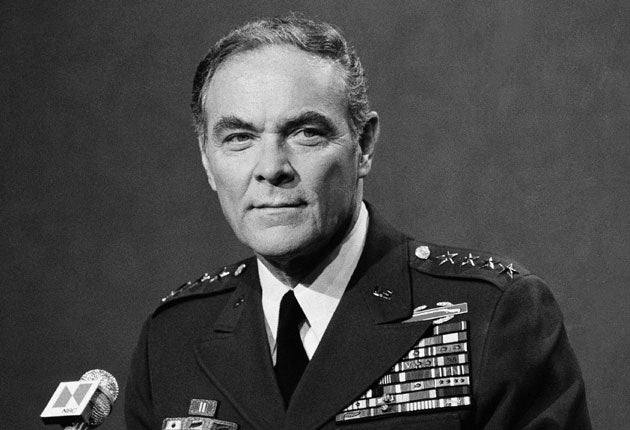Alexander Haig, Reagan's Doctor Strangelove, dies
The soldier and statesman served three presidents but was always haunted by his 'I'm in control' gaffe

Alexander Haig, the four-star general who played a crucial role as White House chief of staff at the climax of the Watergate scandal, and later served as secretary of state during Ronald Reagan's presidency, died yesterday in Baltimore. He was 85.
"I think of him as a patriot's patriot," George Shultz, his successor as secretary of state, said of Haig, who had been admitted to Johns Hopkins hospital in Baltimore last month, with complications from an infection.
Born in Philadelphia in 1924, Haig was one of the soldier-statesmen who have been a constant in American history. He failed in a bid for the Republican nomination for president in 1988, but over two decades occupied some of the highest posts in both the US military and government.
A decorated veteran of both the Korean and Vietnam wars, he was vice-chief of staff of the army in 1973, and between 1974 and 1979 served as supreme allied commander in Europe before a brief spell in civilian life as chief executive of the military contractor United Technologies.
But his most important and controversial posts were in government. To some surprise, the newly elected Reagan chose Haig as secretary of state – and within barely two months the country's top diplomat uttered the ill-considered words that would bedevil him ever after.
Hours after the near-successful assassination attempt on Mr Reagan on 30 March 1981, Haig went into the White House briefing room to tell reporters: "I'm in control here." The remark appeared to betray an ignorance of the constitution: as well as the vice-president, the speaker and the senior member of the Senate also rank ahead of the secretary of state in the line of succession if the president is incapacitated.
More important, it seemed to confirm the square-jawed and forthright Haig as a power-crazed general. "It was reminiscent of Dr Strangelove," Richard Darman, Reagan's deputy chief of staff, would later write. "Haig intended to calm the nation. He unnerved the world."
Haig never lived the episode down. His tenure as secretary of state lasted only 18 months, and was notable for ferocious turf battles with colleagues, and for an unsuccessful effort to mediate a settlement of the Falklands crisis in 1982. After Haig's efforts at shuttle diplomacy between London and Buenos Aires broke down, Britain went to war to reclaim the islands. His replacement that June by steady, unflappable George Shultz brought general relief, inside and outside government.
In fact, Haig's most vital service to his country had come a decade earlier. He had already earned Richard Nixon's confidence during a two-year stint as deputy national security adviser under Henry Kissinger when Nixon made him White House chief of staff in May 1973, just as Watergate began to engulf the presidency.
As the crisis moved to its climax, Haig played a crucial role as a channel between the president and Congress. He gently persuaded Nixon to resign once impeachment proceedings had become a certainty. With a skill belied by his later gaffes, he handled the delicate negotiations for the transfer of power from Nixon to Gerald Ford.
Haig remained at the White House only a few weeks after Nixon stepped down on 9 August 1974. It was widely believed, though never confirmed, that he had brokered a secret deal for Nixon to resign in return for a guarantee from Ford of a pardon – a pardon that would be granted on 8 September 1974.
Subscribe to Independent Premium to bookmark this article
Want to bookmark your favourite articles and stories to read or reference later? Start your Independent Premium subscription today.

Join our commenting forum
Join thought-provoking conversations, follow other Independent readers and see their replies